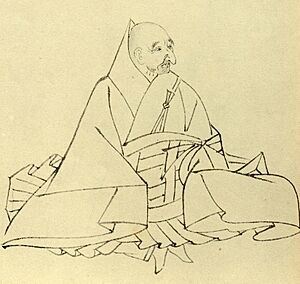Jien facts for kids
Quick facts for kids
Jien
|
|
|---|---|
 |
|
| Born | 17 May 1155 Heian-kyō |
| Died | 28 October 1225 (aged 70) Omi (now Shiga) |
| Occupation | Buddhist monk |
| Genre | history, poetry |
| Subject | Japanese history |
Jien (慈円, 17 May 1155 in Kyoto – 28 October 1225 in Omi) was a Japanese poet, historian, and Buddhist monk. He was a very important person during a time of big changes in Japan.
Contents
Jien's Early Life and Monkhood
Jien was born into the powerful Fujiwara clan. This family was made up of important nobles in Japan. His father was Fujiwara no Tadamichi. Jien's older brother, Fujiwara no Kanezane, later became a regent. A regent was a high-ranking political leader who ruled for the emperor.
Jien started his life as a Tendai monk when he was only eleven years old. He joined a temple called Shōren-in. He first used the Buddhist name Dokaei. Later, he changed it to Jien.
Becoming a Buddhist Leader
In 1192, Jien became the Daisōjō (大僧正). This meant he was the leader of the Tendai Buddhist group. He was 38 years old at the time. His brother, Kanezane, and a powerful warrior named Minamoto no Yoritomo helped him get this important job.
Jien's position as leader was not always steady. He was appointed Daisōjō four different times. This happened because his brother Kanezane's political power went up and down. As a Buddhist leader, Jien also had political duties. He looked after Kujō Michiie, who was his brother Kanezane's grandson.
Jien hoped that Michiie's son, Kujō Yoritsune, would become the shogun. The shogun was the military ruler of Japan during the Kamakura shogunate.
Writing History: The Gukanshō
Jien started to study and write about Japanese history. He wanted to help people understand the big changes happening in the world. He felt that life was full of ups and downs, and history could explain why.
His most famous book is called Gukanshō. He finished it around the year 1220. The title means Jottings of a Fool. In this book, Jien tried to understand the facts of Japanese history.
Jien's View of His Time
In Gukanshō, Jien shared a somewhat sad view of his own time. He believed it was a period of religious decline. He thought that civilization was falling apart. This idea is called mappo. Many people today agree with his view of that time in Japanese history.
Jien also wrote that changes in the way Japan was ruled were necessary. He supported the shogun's claim to power.
Why Jien Wrote Gukanshō
Jien wrote Gukanshō for a special reason. The Emperor Go-Toba wanted to overthrow the Kamakura shogunate. Jien was worried that his family, the Kujō family, would be in trouble. So, he wrote his book to try and convince the emperor not to fight the shogun.
Gukanshō mixes history with Buddhist ideas and old legends. Jien even tried to connect his grand-nephew, Kujō Yoritsune, to a bodhisattva. A bodhisattva is someone who helps others reach enlightenment. Jien wanted to show that Yoritsune had the right to become shogun. He wrote: "The coming of such a Shogun is the plan of the Great Bodhisattva. This person can protect the world and defend the ruler. They have both literary and military skills and dignity. This is a matter of great importance."
The Idea of Dōri
Jien often wrote in Gukanshō that he wanted to make "Dōri" known. Dōri (道理) is an old Chinese idea. It was later used in Buddhism. It generally means reason, principle, or what is the right thing to do.
Jien thought that Dōri had always been present throughout Japanese history. He believed that historical events were not just random. Instead, they were part of a deeper pattern. He felt that understanding Dōri could help people, especially the emperor, shape a better future for Japan.
Jien's Poetry
Jien was also a very talented poet. He was named one of the Thirty-Six Immortals of Poetry. This was a list of the best poets in Japan. More than 91 of his poems are in the Shin Kokin Wakashū, a famous collection of poems.
Jien also had his own family collection of poems called 拾玉集. It contains over 5,900 poems! He was also included in the Ogura Hyakunin Isshu, another well-known poetry collection.
A Famous Poem by Jien
The Zen Buddhist teacher Takuan Sōhō shared one of Jien's poems in his book, The Unfettered Mind. Takuan used the poem to explain the idea of "No-Mind," which is about acting freely without overthinking.
Here is the poem:
The flower that would surrender its fragrance
before my brushwood door
Does so regardless.
I, however, sit and stare
How rueful this world.
See also
- Kankyo no Tomo, a collection of stories once thought to be written by Jien
 | Aurelia Browder |
 | Nannie Helen Burroughs |
 | Michelle Alexander |

